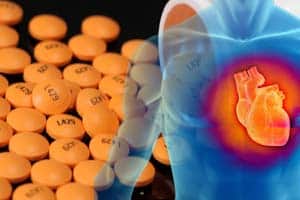
New research suggests that the protective coating found on some aspirins might prevent some of the drug’s health benefits. The finding was accidental, said ABC2 WBAY, and discovered during a study conducted by the University of Pennsylvania, in which researchers were attempting to resolve a medical community debate concerning “aspirin resistance.” Aspirin resistance is the […]
 New research suggests that the protective coating found on some aspirins might prevent some of the drug’s health benefits.
New research suggests that the protective coating found on some aspirins might prevent some of the drug’s health benefits.
The finding was accidental, said ABC2 WBAY, and discovered during a study conducted by the University of Pennsylvania, in which researchers were attempting to resolve a medical community debate concerning “aspirin resistance.” Aspirin resistance is the notion that some people do not receive the heart attack- or stroke-preventing benefits derived from aspirin. Because of this, said ABC2 WBAY, physicians may prescribe those patients with costlier medications.
The belief is that some people’s genes create a resistance to the aspirin’s cardiac benefits, explained The Wall Street Journal. The researchers were challenging that belief, according to their just-released study.
The researchers said that it is not aspirin resistance that is leading to the drug’s reduced effects, but the drug’s coating, that may be mitigating aspirin’s benefits, said ABC2 WBAY. The coating is meant to make the pill both easier to swallow and easier on the stomach and gastrointestinal tract.
Interestingly, the study was funded, in part, by aspirin maker, Bayer, which now refutes the findings, said ABC2 WBAY. The New York Times noted that coated tablets make up most of Bayer’s aspirin sales.
One daily low-dose aspirin, which is between 81 and 162 milligrams, is the typical prescribed dose used to prevent heart attacks in men and strokes in women. Aspirin is also typically given to patients suffering heart attacks and whose blocked arteries were treated with either bypass surgery or a stent, The Wall Street Journal noted.
The study involved 400 healthy patients who were screened for their response to a single dose of either plain or coated aspirin.
Issues with stomach ulcers in some patients gave rise to the now-popular coating. In fact, most aspirin—about 90 percent—sold for heart protection, is manufactured with coating, Dr. Garret FitzGerald, head of the Institute for Translational Medicine and Therapeutics at the University of Pennsylvania, Philadelphia, and senior author of the report, told The Wall Street Journal.
Aspirin helps to prevent blood platelets from clumping or sticking together to form clots, the Journal explained, noting that some recent studies suggest that anywhere from five to 60 percent of all patients may be aspirin resistant, said the Journal. The resistance only seems to affect patients’ ability to receive aspirin’s full cardiac protective benefits and does not affect the drug’s pain efficacy.
The new study was published in the journal, Circulation.


